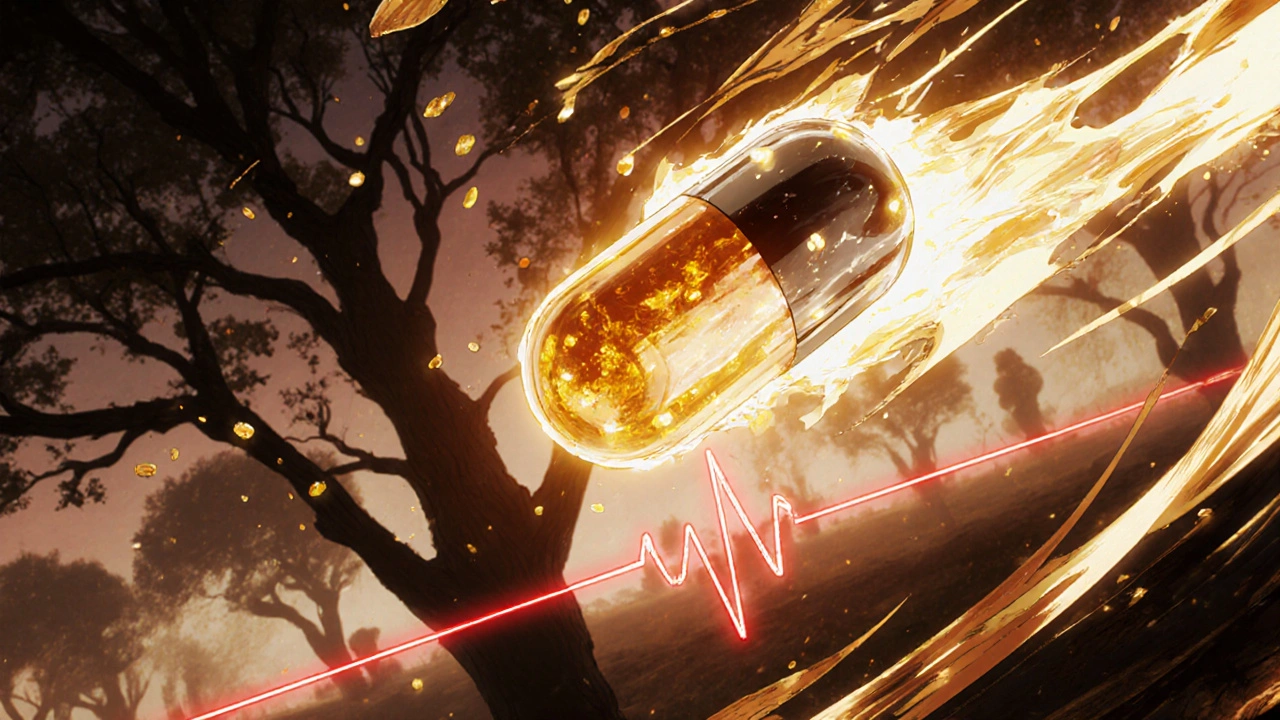Heart Health Supplement Comparison Tool
Which Heart Health Concern Do You Have?
If you're looking at Arjuna bark extract for heart support, you're not alone. Thousands of people in Australia and beyond turn to this ancient Ayurvedic remedy for blood pressure, cholesterol, and overall cardiovascular wellness. But is it the best choice? And what else is out there that might work just as well-or better? Let’s cut through the noise and compare Arjuna with real, science-backed alternatives you can actually use today.
What is Arjuna bark extract really doing?
Arjuna comes from the bark of Terminalia arjuna, a tree native to India and Southeast Asia, whose bark has been used for over 3,000 years in Ayurvedic medicine to support heart function.
Modern studies show it contains compounds like tannins, flavonoids, and triterpenoid saponins that help relax blood vessels, reduce oxidative stress, and improve heart muscle contraction. A 2017 study in the Journal of Cardiovascular Pharmacology found participants taking 500 mg of Arjuna bark extract daily for eight weeks saw a 12% drop in LDL cholesterol and a 7% improvement in left ventricular function compared to placebo.
But here’s the catch: most of the research is small, short-term, and done in India. There’s no large-scale clinical trial from the U.S. or Europe confirming these results in diverse populations. And unlike prescription meds, supplements like Arjuna aren’t regulated for purity or dosage consistency. You could be getting a product with 1% active compounds-or 15%.
CoQ10: The heart’s natural battery
Coenzyme Q10 (CoQ10) is something your body makes naturally-and your heart uses it like fuel. As you age, or if you take statins, your CoQ10 levels drop. That’s why doctors often recommend it for people with heart failure or high blood pressure.
A 2021 meta-analysis of 12 trials involving over 2,000 people found that CoQ10 supplementation (100-200 mg/day) improved ejection fraction by an average of 5.7% and reduced hospitalizations for heart failure by 32%. That’s not just a minor tweak-it’s clinically meaningful.
Compared to Arjuna, CoQ10 has more consistent dosing, stronger evidence from Western trials, and fewer reports of side effects. It also works differently: Arjuna supports vessel tone and reduces inflammation, while CoQ10 directly boosts cellular energy production in heart muscle cells.
Bottom line: If your goal is to improve how hard your heart pumps, CoQ10 is a more reliable choice.
Hawthorn: The Western cousin of Arjuna
Hawthorn (Crataegus monogyna or Crataegus laevigata) is the European answer to Arjuna. It’s been used for centuries in herbal medicine to treat mild heart conditions, especially high blood pressure and angina.
Like Arjuna, hawthorn contains flavonoids and oligomeric procyanidins that help dilate blood vessels and improve circulation. A 2008 review in the British Journal of General Practice concluded that hawthorn extract was as effective as low-dose ACE inhibitors for early-stage heart failure-with fewer side effects.
Here’s where it beats Arjuna: hawthorn has been studied in Germany, France, and the U.S. with standardized extracts (300 mg daily of 18.75% procyanidins). You know exactly what you’re getting. Arjuna? Not so much.
Also, hawthorn is widely available in capsules, teas, and tinctures in Australia and the U.S. Arjuna is harder to find outside specialty Ayurvedic shops.

Magnesium: The silent heart hero
Most people think of magnesium for muscle cramps or sleep. But your heart needs it just as much. Magnesium regulates heart rhythm, helps blood vessels relax, and lowers blood pressure by blocking calcium from overloading cells.
A 2023 study in the Journal of the American Heart Association followed 10,000 adults over 10 years. Those with the highest dietary magnesium intake had a 22% lower risk of heart disease. Supplementing with 300-400 mg of magnesium glycinate daily improved systolic blood pressure by an average of 5.6 mmHg in people with hypertension.
Unlike Arjuna, magnesium is cheap, safe, and backed by massive population data. It’s also a foundational nutrient-most people are deficient. If you’re taking Arjuna for blood pressure, you might be missing the bigger picture: you could be low on magnesium.
Try this: Take 400 mg of magnesium glycinate at night. Wait six weeks. Then check your blood pressure. You might not even need Arjuna anymore.
Garlic supplement: The underrated contender
Garlic isn’t just for cooking. Aged garlic extract (AGE), the kind used in clinical trials, has been shown to reduce arterial plaque buildup and lower blood pressure.
A 2020 double-blind trial in the Journal of Nutrition gave 600 mg of aged garlic extract daily to 50 adults with high blood pressure. After 12 weeks, their systolic pressure dropped by 11 mmHg-similar to Arjuna’s results. But garlic also reduced C-reactive protein (a marker of inflammation) by 28% and lowered LDL cholesterol by 10%.
Garlic is easier to find than Arjuna. It’s in most health stores. And unlike Arjuna, which can interact with blood thinners, garlic has a very low risk of adverse effects when taken as a standardized extract.
How do they stack up? A quick comparison
| Supplement | Key Benefit | Dosage | Evidence Strength | Availability in Australia | Side Effect Risk |
|---|---|---|---|---|---|
| Arjuna bark extract | Improves heart muscle function, lowers LDL | 500-1,000 mg/day | Moderate (mostly Indian studies) | Hard to find | Low (possible GI upset) |
| CoQ10 | Boosts heart energy, reduces heart failure symptoms | 100-200 mg/day | High (multiple Western trials) | Easy | Very low |
| Hawthorn | Lowers BP, improves circulation | 300 mg standardized extract/day | High (European clinical use) | Easy | Low |
| Magnesium | Regulates rhythm, lowers BP, prevents arrhythmias | 300-400 mg/day (glycinate) | Very high (population studies) | Easy | Low (diarrhea at high doses) |
| Aged garlic extract | Reduces plaque, lowers LDL and BP | 600 mg/day | High (U.S. and European trials) | Easy | Very low |

Who should take Arjuna-and who shouldn’t?
Arjuna might make sense if:
- You’re drawn to Ayurvedic traditions and prefer plant-based remedies
- You’ve tried other supplements and want to explore something different
- You have mild hypertension or early-stage heart strain and want a gentle support
But avoid Arjuna if:
- You’re on blood thinners (warfarin, aspirin)-Arjuna may increase bleeding risk
- You’re pregnant or breastfeeding-no safety data exists
- You have low blood pressure-it could drop too far
- You’re looking for a guaranteed, FDA-approved solution
Most people would be better off starting with CoQ10, magnesium, or aged garlic. They’re cheaper, easier to find, and backed by stronger evidence.
Real-world tip: Stack them smartly
Here’s what works for many people in Melbourne who’ve tracked their heart health over 6-12 months:
- Start with 400 mg magnesium glycinate at night
- Add 100 mg CoQ10 with breakfast
- Take 600 mg aged garlic extract at lunch
- After 8 weeks, check your blood pressure and cholesterol
- If you still want more support, try 500 mg Arjuna in the evening
Why this order? Because magnesium and CoQ10 fix the root causes-low cellular energy and poor vessel function. Arjuna is more of a supporting actor. Use it last, not first.
Final thought: Don’t chase the exotic
Just because Arjuna comes from ancient India doesn’t mean it’s superior. The most effective heart supplements aren’t always the rarest. The ones with the most data, the clearest dosing, and the widest availability often win.
Arjuna has potential. But if you’re serious about your heart health, start with what’s proven, affordable, and easy to get. Save Arjuna for step two-if you need it at all.
Can I take Arjuna with my blood pressure medication?
Talk to your doctor first. Arjuna may enhance the effects of ACE inhibitors, beta-blockers, or diuretics, potentially causing your blood pressure to drop too low. It can also increase bleeding risk if you’re on blood thinners like warfarin. Never combine it with prescription meds without medical supervision.
How long does it take for Arjuna to work?
Most people notice subtle changes-like less chest tightness or lower resting heart rate-after 4 to 6 weeks. For measurable changes in cholesterol or blood pressure, you’ll need at least 8 to 12 weeks of consistent use. Don’t expect quick fixes; this isn’t a stimulant. It works slowly by supporting long-term heart function.
Is Arjuna better than fish oil for heart health?
They do different things. Fish oil (EPA and DHA) reduces triglycerides and inflammation, while Arjuna supports heart muscle strength and blood vessel tone. If your triglycerides are high, fish oil wins. If your heart feels weak or you have mild heart failure, Arjuna might help more. Many people take both-they’re complementary, not competing.
Can I get Arjuna from food?
No. Terminalia arjuna is not a food plant. You can’t eat the bark or drink tea from it safely without proper extraction. All forms of Arjuna used for health are concentrated extracts sold as capsules or powders. Don’t try to chew bark or brew your own tea-it’s not safe or effective.
What’s the best brand of Arjuna to buy?
Look for brands that specify the extract ratio (e.g., 10:1 or 20:1) and list the active compound content (like total flavonoids or arjunolic acid). Avoid products that just say "Arjuna bark powder"-that’s not standardized. In Australia, brands like Integrative Medicine, Pure Encapsulations, and BioCeuticals have reliable Arjuna extracts. Check for third-party testing (NSF or USP) on the label.


Dion Hetemi
November 19 2025Arjuna? More like Arjuna-never-heard-of-it-until-this-post. CoQ10 and magnesium are the real MVPs here-cheap, proven, and not buried in some Ayurvedic temple. Why gamble on a tree bark when your heart’s already running on 90% battery?